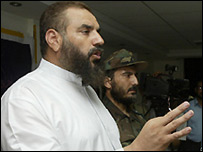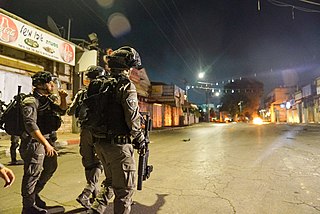Related Research Articles
Sheikh Ahmed Ismail Hassan Yassin was a Palestinian politician and imam who founded Hamas in 1987. He also served as the first chairman of the Hamas Shura Council and de facto leader of Hamas since its inception from December 1987 until his assassination in March 2004.

The Popular Resistance Committees is a coalition of a number of armed Palestinian groups opposed to what they regard as the conciliatory approach of the Palestinian Authority and Fatah towards Israel.
Ahmed al-Jabari, also known as Abu Mohammad, was a senior leader and second-in-command of the military wing of Hamas, the Izz ad-Din al-Qassam Brigades. He was widely credited as the leading figure in the Hamas takeover of the Gaza Strip, and commanded the 2006 Hamas cross-border raid which resulted in the capture of Israeli soldier Gilad Shalit. Under his command, along with chief logistics officer Mahmoud al-Mabhouh, Hamas developed its own military weapons capability significantly by acquiring longer-range guided missiles and rockets.

In 2008, Israel sought to halt the rocket and mortar fire from Gaza that killed four Israeli civilians that year and caused widespread trauma and disruption of life in Israeli towns and villages close to the Gaza border. In addition, Israel insisted that any deal include an end to Hamas's military buildup in Gaza, and movement toward the release of Corporal Gilad Shalit. Hamas wanted an end to the frequent Israeli military strikes and incursions into Gaza, and an easing of the economic blockade that Israel has imposed since Hamas took over the area in 2007.

In 2008 the Israel Defense Forces launched Operation Hot Winter, also called Operation Warm Winter, in the Gaza Strip, starting on February 29, 2008 in response to Qassam rockets fired from the Strip by Hamas onto Israeli civilians. At least 112 Palestinians, along with three Israelis, were killed, and more than 150 Palestinians and seven Israelis were injured.

The Gaza–Israel conflict is a localized part of the Israeli–Palestinian conflict beginning in 1948, when about 200,000 of the more than 700,000 Palestinians who fled or were expelled from their homes settled in the Gaza Strip as refugees. Since then, Israel has been involved in about 15 wars involving organizations in the Gaza Strip. The number of Palestinians killed in the ongoing 2023–2024 war (41,000) is higher than the death toll of all other wars in the Israeli-Palestinian conflict combined.

Nizar Rayan was a high-ranking Hamas leader who served as a liaison between the Palestinian organization's political leadership and its military wing. Also a professor of Islamic law, he became a top Islamic cleric within Hamas after the death of Sheikh Ahmed Yassin in 2004. Rayan was a strong promoter between 1994 and 2004 of suicide bombings on Israel, and his son killed himself on one such mission. Rayan and most of his family were killed in an Israeli airstrike during the Gaza War.

The 2014 Gaza War, also known as Operation Protective Edge, and Battle of the Withered Grain, was a military operation launched by Israel on 8 July 2014 in the Gaza Strip, a Palestinian territory that has been governed by Hamas since 2007. Following the kidnapping and murder of three Israeli teenagers in the West Bank by Hamas-affiliated Palestinian militants, the Israel Defense Forces (IDF) initiated Operation Brother's Keeper, in which it killed 10 Palestinians, injured 130 and imprisoned more than 600. Hamas reportedly did not retaliate but resumed rocket attacks on Israel more than two weeks later, following the killing of one of its militants by an Israeli airstrike on 29 June. This escalation triggered a seven-week-long conflict between the two sides, one of the deadliest outbreaks of open conflict between Israel and the Palestinians in decades. The combination of Palestinian rocket attacks and Israeli airstrikes resulted in over two thousand deaths, the vast majority of which were Gazan Palestinians. This includes a total of six Israeli civilians who were killed as a result of the conflict.

Khalil al-Hayya is a Palestinian politician who has served as the deputy chairman of the Hamas Political Bureau since August 2024, succeeding deceased Saleh al-Arouri. He also serving as one of the acting quinquevirate leadership of Hamas, alongside with Khaled Mashal, Zaher Jabarin, Muhammad Ismail Darwish, and an unnamed Hamas official after Yahya Sinwar was killed by the IDF in October 2024. He also was elected to the Palestinian Legislative Council since January 2006 as a representative of Gaza City.
The following is a timeline of the 2014 Gaza War. Over 2014, Palestinians suffered the highest number of civilian casualties since the Six-Day War in 1967, according to a United Nations report, given the July–August conflict, and rising tolls in the West Bank and East Jerusalem. A spike in Israeli casualties also occurred. 2,256 Palestinians and 85 Israelis died, while 17,125 Palestinians, and 2,639 Israelis suffered injuries.

Project Unified Assistance (PUA) is a nonprofit organization based in San Francisco. The primary focus of the organization is a proposal to establish a humanitarian United Nations-operated airport in the Gaza Strip. PUA believes that the lack of an airport in Gaza infringes on the human right of Gaza citizens to move freely, as well as negatively impacts the economic development and safety of citizens of the region, and that a UN-operated airport can alleviate these issues while ensuring the security of Israel.

The 2021 Gaza War, sometimes called the Unity Intifada, was a major outbreak of violence in the Israeli–Palestinian conflict that mainly commenced on 10 May 2021, and continued until a ceasefire came into effect on 21 May. It was marked by protests and police riot control, rocket attacks on Israel by Hamas and Palestinian Islamic Jihad (PIJ), and Israeli airstrikes in the Gaza Strip. The crisis was triggered on 6 May, when Palestinians in East Jerusalem began protesting over an anticipated decision of the Supreme Court of Israel on the eviction of six Palestinian families in the East Jerusalem neighborhood of Sheikh Jarrah. Under international law, the area, effectively annexed by Israel in 1980, is a part of the Israeli-occupied West Bank; On 7 May, according to Israel's Channel 12, Palestinians threw stones at Israeli police forces, who then stormed the Al-Aqsa Mosque compound using tear gas, rubber bullets, and stun grenades. The crisis prompted protests around the world as well as official reactions from world leaders.
The following is a timeline of events during the Israeli–Palestinian conflict in 2021, including the 2021 Israel–Palestine crisis.
The year 2023 in Israel was defined first by wide-scale protests against a proposed judicial reform, and then by the Hamas-led attack on Israel on October 7, which led to a war and to Israel invading the Gaza Strip.
Events in the year 2023 in Palestine.

Standing Together is an Israeli grassroots movement that aims to bring together Arab Israeli and Jewish Israeli communities in the struggle for Israeli-Palestinian peace, equality and social justice. It is the largest Arab-Jewish grassroots movement in the country. Standing Together first became active in 2015, and has about 5,300 members as of April 2024. The movement opposes neoliberalism and the Israeli occupation of the Palestinian territories. It aims to further LGBT rights, women's rights, workers' rights and full equality for Palestinian citizens of Israel. Since the Israel–Hamas war began in October 2023, the movement has played a leading role in the anti-war and pro-ceasefire protests within Israeli society.
Events of the year 2024 in Israel.
Events in the year 2024 in Palestine.
References
- 1 2 3 4 5 6 Ehsanipour, Asal (2023-12-15). "'I'm Pro-Humanity': One Palestinian's Call for Peace in the Face of Tragedy". www.kqed.org. Retrieved 2024-03-03.
- ↑ Alkhatib, Ahmed [@afalkhatib] (April 25, 2024). "Today is my birthday, and I don't desire to celebrate or do anything but continue helping my family & others in Gaza, promote meaningful engagements between Palestinians & Israelis, and push for a pragmatic path forward" (Tweet). Retrieved April 25, 2024– via Twitter.
- 1 2 Alkhatib, Ahmed Fouad (2023-10-20). "An Israeli airstrike just destroyed my family home in Gaza. I refuse to be consumed by hate and revenge". The Forward . Retrieved 2024-03-03.
- 1 2 3 "Let there be an airport in Gaza". The Times of Israel . Retrieved 2017-07-09.
- 1 2 Alkhatib, Ahmed Fouad (2024-01-04). "Israel Killed My Family, but Not My Hope". The Atlantic . Retrieved 2024-03-03.
- 1 2 Alkhatib, Ahmed Fouad. "A failed trip to Jerusalem". The Jerusalem Post . Retrieved 2017-07-09.
- 1 2 Chorin, Ethan. "A Humanitarian Airport For Gaza: An Interview with Ahmed Alkhatib". Forbes. Retrieved 2017-07-09.
- 1 2 Wall, Alex (2024-01-24). "Bay Area Gazan turns loss into compelling case for a 'different future'". J. The Jewish News of Northern California . Retrieved 2024-03-03.
- 1 2 "Project Unified Assistance - A Proposal for Hope and Stability in Gaza". Project Unified Assistance - A Proposal for Hope and Stability in Gaza. Retrieved 2017-07-09.
- ↑ "Ahmed Fouad Alkhatib". The Atlantic. Retrieved 2024-03-03.
- ↑ "Ahmed Fouad Alkhatib Archives". The Forward. Retrieved 2024-03-03.
- ↑ "Ahmed Fouad Alkhatib". Haaretz. Retrieved 2024-03-03.
- ↑ Alkhatib, Ahmed Fouad (2024-02-26). "The Origin of Hamas's Human Shields Strategy in Gaza". Newsweek. Retrieved 2024-03-03.
- ↑ "Ahmed Fouad Alkhatib". The Times of Israel.
- ↑ Ahmed Fouad Alkhatib, The Jewish Chronicle
- ↑ Hamas Sees Peace as Weakness, by Ahmed Fouad Alkhatib, Dec. 18, 2023, WSJ
- ↑ Ahmed Fouad Alkhatib, WINEP
- ↑ Ahmed F. Alkhatib, Atlantic Council
- ↑ "Israel shouldn't keep a military presence in Gaza after the war, analyst says". NPR . 2024-02-05. Retrieved 2024-03-03.